外研版 八年级下 Module 2 Unit 1 I've also entered lots of speaking competitions. 课件 (1) (共82张PPT,无音频)
文档属性
| 名称 | 外研版 八年级下 Module 2 Unit 1 I've also entered lots of speaking competitions. 课件 (1) (共82张PPT,无音频) |

|
|
| 格式 | ppt | ||
| 文件大小 | 3.1MB | ||
| 资源类型 | 教案 | ||
| 版本资源 | 外研版 | ||
| 科目 | 英语 | ||
| 更新时间 | 2022-07-13 09:55:52 | ||
图片预览

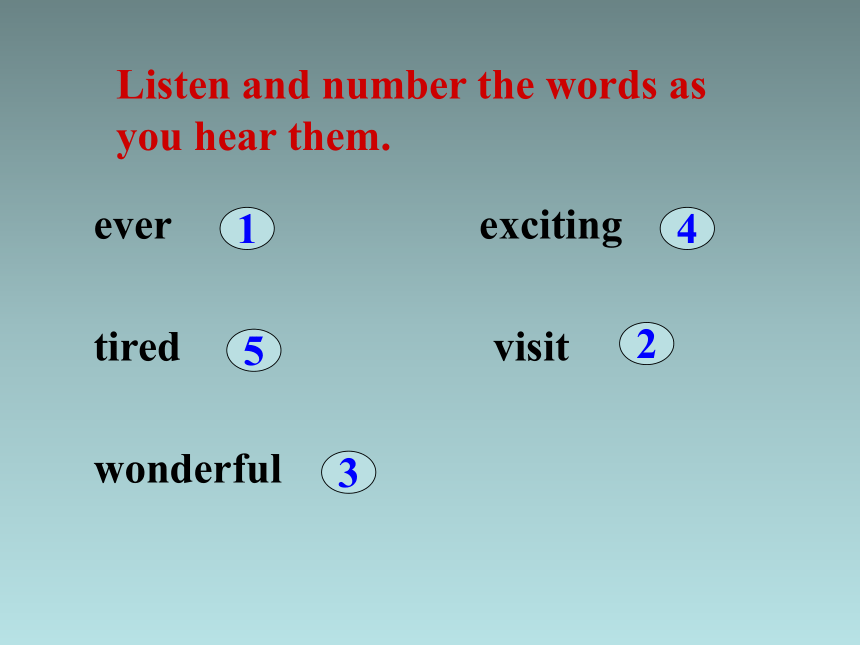
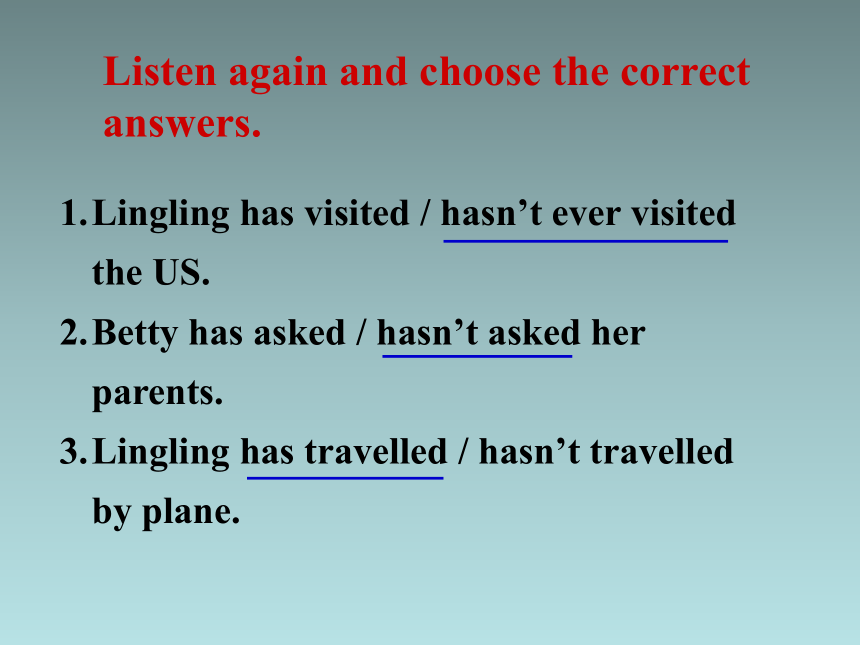
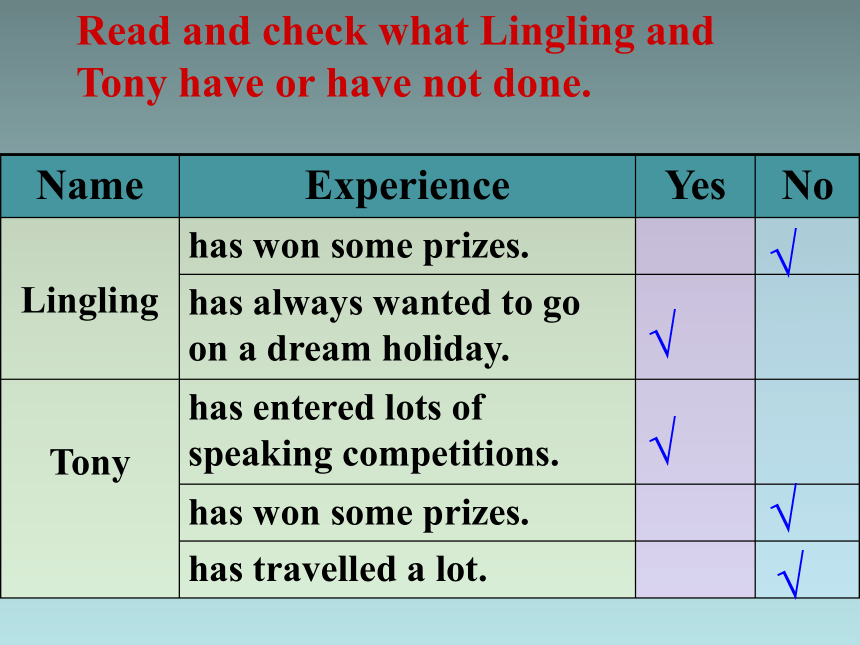
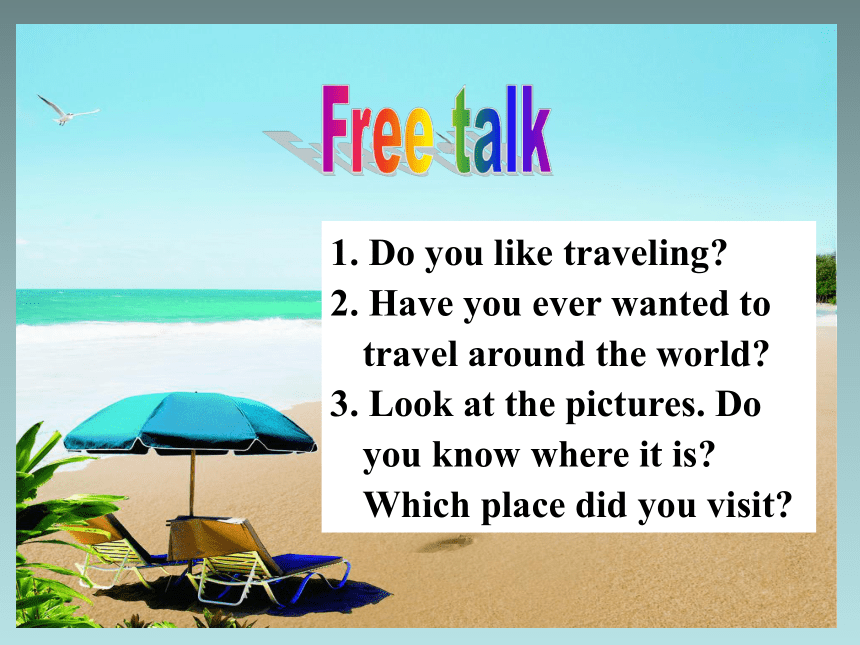
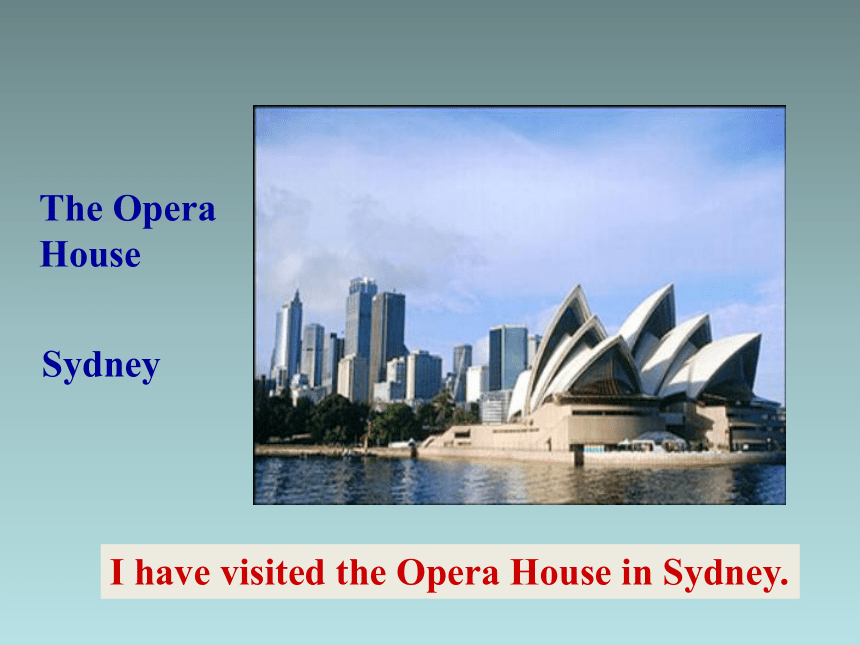


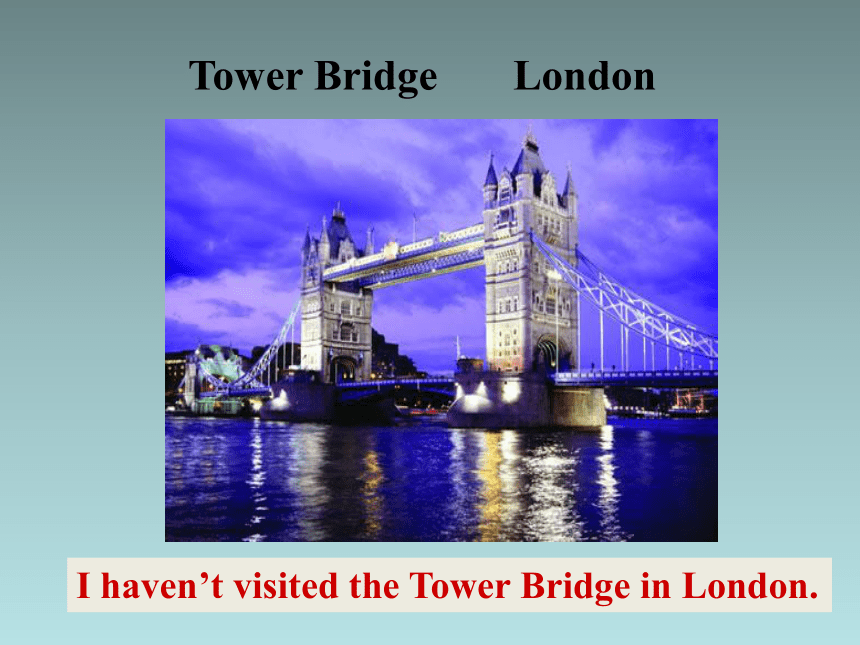

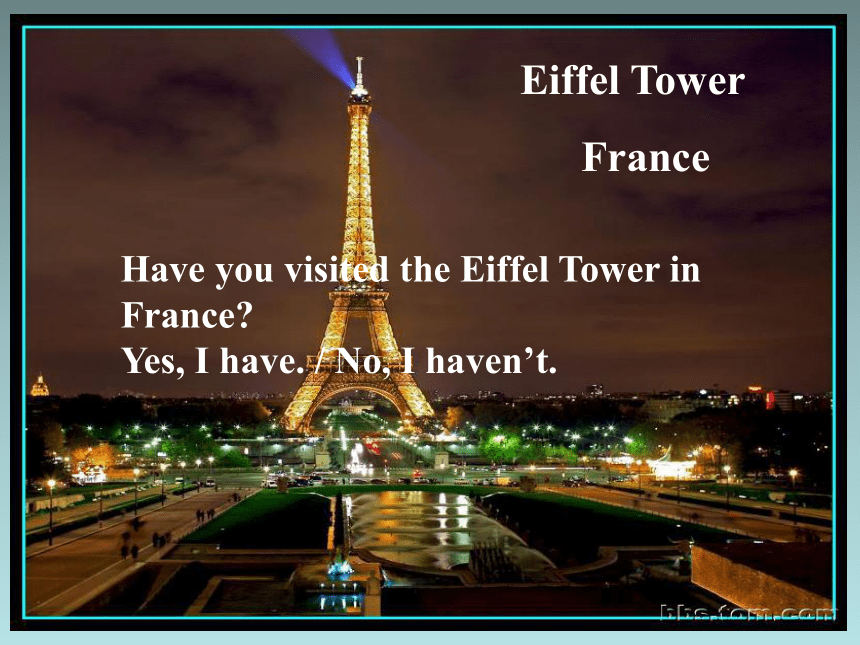
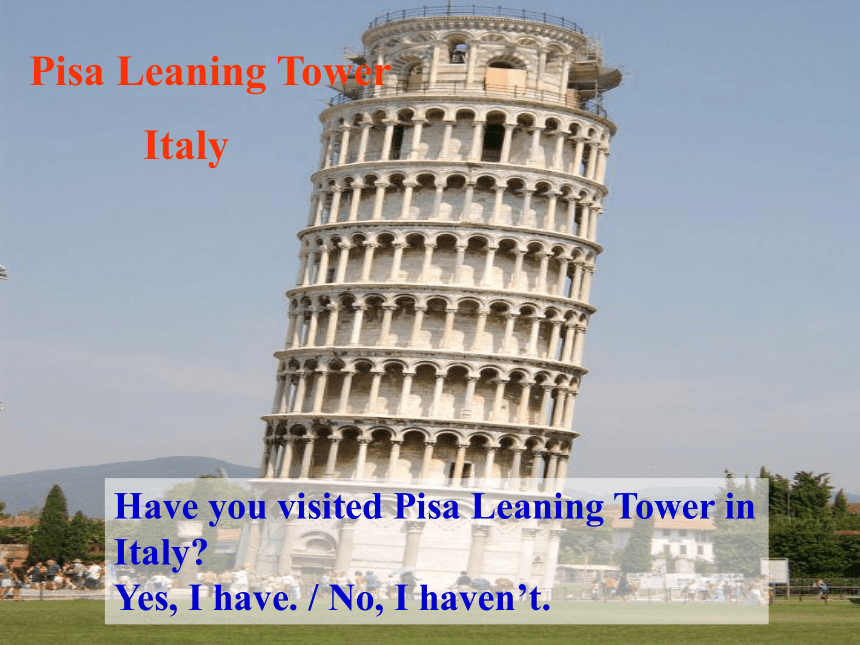
文档简介
(共82张PPT)
Unit 1 I’ve also entered lots of speaking competitions.
1
2
3
4
5
Listen and number the words as you hear them.
ever
exciting
tired
visit
wonderful
Listen again and choose the correct answers.
Lingling has visited / hasn’t ever visited the US.
Betty has asked / hasn’t asked her parents.
Lingling has travelled / hasn’t travelled by plane.
Read and check what Lingling and Tony have or have not done.
Name Experience Yes No
Lingling has won some prizes.
has always wanted to go on a dream holiday.
Tony has entered lots of speaking competitions.
has won some prizes.
has travelled a lot.
√
√
√
√
√
1. Do you like traveling
2. Have you ever wanted to travel around the world
3. Look at the pictures. Do you know where it is Which place did you visit
The Opera House
Sydney
I have visited the Opera House in Sydney.
Buckingham Palace
London
I have visited Buckingham Palace in London.
Disneyland
in America
I haven’t visited the Disneyland in America.
Tower Bridge London
I haven’t visited the Tower Bridge in London.
Pyramid
in Egypt
I have visited the Pyramid in Egypt.
Eiffel Tower
France
Have you visited the Eiffel Tower in France
Yes, I have. / No, I haven’t.
Pisa Leaning Tower
Italy
Have you visited Pisa Leaning Tower in Italy
Yes, I have. / No, I haven’t.
The White House
in America
Have you visited the White House in America
Yes, I have. / No, I haven’t.
The Tian’anmen Square
in Beijing
Have you visited the Tian’anmen Square
Yes, I have. / No, I haven’t.
Have you ever traveled by plane before
Did you travel by plane this winter holiday
Yes, I did.
/ No, I didn’t.
Yes, I have.
/ No, I haven’t.
Have you watched the film before
Yes, I have.
/ No, I haven’t.
A: Have you ever visited …
B: Yes, I have.
( No, I haven’t.)
I have visited …
Have you ever visited…
Yes, I have.
No, I haven’t.
1
2
3
4
5
Listen and number the words as you hear them.
ever
exciting
tired
visit
wonderful
Listen and discuss
What king of competition does
Lingling enter
A speaking competition.
2. Has Lingling ever won any prize of the competition before
3. Why did Lingling always want to go on a dream holiday
No, she hasn’t.
Because she can’t afford it. The plane tickets are too expensive.
1. What’s the first prize of the competition
It’s “my dream holiday”.
Read and answer
4. Has Tony ever won any prizes of the competition before
5. What’s the first prize of the writing competition
No, he hasn’t.
The first prize is a book called Around the World in 80 Days.
Fill in the blanks according to the dialog. Then retell the dialog.
Lingling is entering a speaking ___________. The first _____ is “My dream holiday”. She hasn’t _____ any prizes before. She has always wanted to go on a dream holiday but she can’t _______ it.
Tony has _____ entered lots of speaking competitions, but he hasn’t won any prizes.
competition
prize
afford
ever
won
He has stopped ______ now. Lingling suggests Tony enter a writing competition. It needs to write a story about a place you’ve ______. Tony _____ Lingling to _____ with him if he wins the prize of the writing competition, but the first prize is only the ______ ______ Around the World in 80 Days.
trying
visited
travel
invites
book
called
Make a new dialogue according to
Activity 3. Then act it out.
Work in pairs.
Ask and answer questions about what Lingling and Tony have or haven’t done.
--- Has Lingling ever won any prizes before
--- No, she hasn’t.
For example:
Match the words with their meanings.
afford competition dream invite pity prize
1. ________ a group of thoughts, ideas or feelings happening in your mind when you go to sleep.
_______ be able to buy or pay for, be rich enough to buy, have enough to spare.
_______ sympathy for sb's suffering or unhappiness
dream
afford
pity
4. ____________ a test of ability or skill, we usually see it on television, in newspaper or at our school.
5. ____________ request presence or participation of; ask for request, especially politely or formally
6. ________ something that given to you when you are successful in a game or a competition
competition
invite
prize
Then complete Activity 5.
Read and make a dialogue with
each one.
· Good luck!
· That’s a pity.
· That sounds wonderful!
1. A: I'm going to take an English test
tomorrow.
B: Good luck!
2. A: There's still smog today. We'll
have to go to school with face masks.
B: That’s a pity.
3. A: How about going boating on
Saturday
B: That sounds good.
Read and predict which words the speaker is likely to stress. Then, listen and check.
Read in roles and say aloud the words the speaker stresses.
--- Have you ever wanted to travel around the world
--- Yes, I have. I’ve always wanted to travel around the world.
--- Have you ever visited New York
--- No, I haven’t. I’ve never visited the US.
--- Have you ever entered a competition
--- No, I haven’t. I haven’t entered any competitions.
Work in pairs Ask and answer questions.
Task 1 Make a questionnaire.
A: Have you ever wanted to travel around the world
B: Yes, I have./ No, I haven’t.
…written a book
…gone to a rock concert
…eaten foreign food
…read a book in English
…swum in the sea
… cooked a western meal
…been to USA
… won a prize in a competition
Task 2 Make a dialogue
假设你的笔友今年暑假第一次来北京参观,你作为导游带他参观北京。请仿照Activity 6对话的形式,询问他在北京想做的事情,并给他提供一些帮助。
参考句型和词汇:
Have you ever watched the DVD about China
Yes, I have.
visit many places
eat Chinese food
roast duck
It sounds brilliant!
make a travel plan
1 Her_____________was to study at a good university one day.
dream
2 When I was in school, I won many___________ for my writing.
prizes
3 You must enter the music ________________! You will beat everybody.
beat sb 打败某人
win sth 赢得某物
competition
4 My family cannot________to buy a ticket for the match.
can't afford to do sth
支付不起做某事
afford
5. It's a(n)_________that you did not come to see the film with us.
pity
6.John__________his new friends to his birthday party last week.
invite sb to do sth
邀请某人做某事
invite sb to+某地
邀请某人去某地
invited
1 What is Lingling doing
Lingling is entering a speaking competition.
2 What can it will improve And maybe what
It will help you improve your speaking. And mabye you will win a prize.
Tony has also entered lots of speaking competitions, but he hasn't won any prizes. He has stopped trying now.
Here's a writing competition: Around the World in 80 Days. To win it, you need to write a short story about a place you've visited.
7 How does Tony write about the story What is Lingling's advice
The story doesn't need to be true! You can make it up.
8 What does Tony's hope and what will he do
Tony hopes(that) he will win, then he will invite Lingling to come with him.
The first prize is only the book called Around the World in 80 Days.
1 Have you ever won any prizes before
have/has sb.(人称代词的主格)ever+动词的过去分词,用于询问某人过去的经历,ever表示“曾经”,用以加强语气
Has she ever been to France 她曾经去过法国吗?
have/has sb.ever+动词过去分词+…其他 用于询问某人过去的经历,ever表示曾经,用于加强语气
【拓展】ever的其他用法
用于否定句,疑问句,意思是‘在任何时候,曾经’
ever since 自..以后,从…起,多用于现在完成时态
2 I’m entering a competition.
enter v 参加,报名
【拓展】enter还可作“进入”讲,相当于come into,go into,所以enter当作“进入”讲时,其后不再加介词into
3 The first prize is My dream holiday.
prize n. 奖品,奖项
win/ get the first prize 赢得一等奖
4 I’ve always wanted to go on a dream holiday.
dream n. 梦,梦想 v. 做梦
dream of/ about+n 梦想着…
dream of/ about doing sth 梦想着做..
I dream of/ about a holiday.
I dream of/about going to Beijing.
5 But I can’t afford it.
afford v. 买得起,付得起,后接名词,代词,也接动词不定式做宾语,常与can(could)/be able to 连用
I can’t afford this book.
I can afford to buy this bicycle.
I am able to afford..我买得起...
I am not able to afford…我买不起...
I am able to afford this book.
I am able to afford to buy this book.
invite v. 邀请
n. invitation
邀请某人 invite sb
邀请某人到某个地方 invite sb to +某地
邀请某人去做某事 invite sb to do sth
6 You can make it up.
make up 编造,组成
I like making up stories. 我喜欢编故事。=I like make them up.
Four people make up a group.
四人组成了一个组。
make +it/them(代词)+up
make up+n
7. I’ve stopped trying now.
stop doing sth. 停止正在做某事
stop to do sth. 停止手头上做的事情去做另外一件事
The two girls stopped talking when they saw me.
那两个女孩一见到我就停止了讲话。
The two girls stopped to talk to me when they saw me.
这两个女孩一看到我就停下来和我讲话。
1 我们付不起去音乐会的票
1 We can’t afford to the concert.
2 大明邀请我去吃晚餐。
Daming invites me dinner.
3 你曾考虑 过其他种类的活动吗?
Have you ever other kinds of activities
4 当老师进来的时候,学生们停止了交谈。
When the teacher came in, students stopped
.
Language points
1. … hasn’t ever visited the US.
ever adv. 曾经;在任何时候;究竟;一直;永远
I don't think I ever met you. 我觉得我没见过你。
Have you ever been to Beijing 你去过北京吗
Nothing ever happens in this village. 这村里从来没有发生过什么事情。
Who ever can it be 那究竟会是谁呢
What ever is she doing 她究竟在做什么
They were very happy ever afterwards. 以后他们一直幸福地生活着。
2. … you will win a prize.
win v. 赢;获胜;获得
He was confident that he would win.
他自信会获得胜利。
How can I win back her trust
我怎样能重新赢得她的信任
win n. 胜利
The voters gave a narrow win to Vargas Llosa.
投票者使巴尔加斯·略萨险胜。
winner n. 获胜者
win和beat都可用作及物动词,作“赢、战胜”讲时,其区别主要在于宾语的不同:充当win的宾语的是比赛、战争、奖品、金钱等名词,即race, match, game, war,
competition, prize之类的词;充当beat的宾语的则是比赛、竞争的对手,即指人或球队的名词或代词。如:
[辨析] win, beat
He won the first prize in the surfing competition.
他在冲浪比赛中获得第一。
We beat the strongest team in the football match this time.
这次在足球赛中我们战胜了最强的那个队。
1. Who do you think will ________ the next election
2. The athlete _______ his competitors and _______ the gold medal.
3. Last week our school _____ their school in football match.
win
beat
Practice
won
beat
prize多指在竞赛、竞争中获胜所赢得的奖。
Hundreds of prizes can be won in our newspaper competition.
参加我们报纸的竞赛可以赢得数以百计的奖品。
3. The first prize is “My dream holiday”.
dream作名词, 是可数名词, 意为“梦想;梦”。如:
I had some very strange dreams last night.
昨晚我做了很奇怪的梦。
My son's dream is to be an astronaut.
我儿子的理想是当宇航员。
dream还可作动词, 常见用法如下:
(1) dream of / about sth. 意为“梦见/梦想某事”。
(2) dream of / about doing sth. 意为“梦见/ 梦想做某事”。
(3) dream + that从句。
When you go to sleep, what do you dream about
当你睡觉时, 你梦到什么了?
[注意]
dream的过去式为dreamed或dreamt, 过去分词为dreamed或dreamt。
He dreams of one day becoming a famous violinist.
他梦想有朝一日成为著名的小提琴家。
I never dreamed that I should see you again.
我从来没有想过会再次见到你。
我梦想有一天拥有一座漂亮的花园。
I dream of ___________ (have) a beautiful garden some day.
许多年轻人总是梦想成为有名的篮球运动员。
Many young people always ________ ________ becoming famous basketball players.
having
dream of
4. But I can’t afford it.
afford v. 提供, 供应得起, 给予
They walked because they couldn't afford (to take) a taxi.
他们因为坐不起计程车而步行。
These trees afford a pleasant shade.
这些树提供了荫凉。
I'd love to go on holiday but I can't afford the time.
我倒想去度假, 可是抽不出时间来。
afford的用法:
(1) afford(担负得起)通常要与 can, be able to 连用。
误: He doesn’t afford (to have) a car.
正: He can’t afford (to have) a car.
他买不起小汽车。
(2) 在现代英语中 afford(负担得起)不用于被动语态。
误: Such things can be afforded by many people.
正: Many people can afford such things.
那样的东西许多人可以买得起。
(3) afford (负担得起)可用于金钱方面(用于 afford to buy 之类 的),但通常不直接以 money 为宾语。
误: I want to get my car repaired because I can’t afford the money for a new one.
正: I want to get my car repaired because I can’t afford (to buy) a new one.
我想请人把车子修一下, 因为我买不起新的。
(4) afford(提供)可接双宾语(直接宾语通常为抽象概念),若双宾语易位,要用介词 to。注意: afford 表示“提供”时, 无需 与 can, be able to 连用。
误: Television affords pleasure for us.
正: Television affords pleasure to us.
电视给我们以快乐。
我弟弟需要一台电脑,但是他买不起。
My brother needs a computer, but he can’t _________ to buy one.
I can’t afford _______ the fully automatic washer now.
A. for buying B. to buy
C. buy D. bought
afford
B
5. I’ve also entered lots of speaking competitions.
enter v. 进入
可指进入某一时代或阶段,如某一学业、经历或程序的开始等;也可表示参加某一团体或组织,成为其中的一员。
Please do not enter before knocking on the door.
进来前请先敲门。
He has no choice but enter that college.
他不得不进入那所大学读书。
You should take off your shoes before you ______ the new flat. A. leave B. find
C. choose D. enter
【解析】词语辨析。leave“离开,留下”;find“找到,发现”;choose“选择”;enter“进入”。根据句意“在你进入新公寓之前,你要脱掉你的鞋子”,故答案为D。
D
1) We are tired. Let’s stop _______ a rest.
我们累了,我们停下来歇会儿吧。
2) “Stop _______, please. Let’s sing an English song,” said the teacher.
“不要说话了,让我们唱支英文歌曲吧。”老师说。
3) When the teacher came in, the students stopped _______; when the teacher went out, the students stopped ________.
老师走进来时,学生们停止说话;老师走出去时,学生们又停下来开始说话了。
to have
talking
talking
to talk
Practice
7. You can make it up.
make up (1) 编造,虚构
The student made up an excuse for his being late.
那个学生为迟到编造了一个借口。
Their father is good at making up bed time stories.
他们的父亲很擅长睡觉前编些故事讲给他们听。
He asked us each to make up a dialogue.
他让我们每人编一段对话。
(2) 组成,形成
Six women and nineteen men make up the committee.
六位妇女和十九位男人组成了委员会。
They make up one-third of the province’s population.
他们占全省人口的三分之一。
Make up sentences with the words given.
用所给的词造句。
(3)化装,打扮
The girl made up her face carefully before going to meet James.
这姑娘在与詹姆斯会面之前,精心地化装了一番。
It took her more than an hour to make herself up.
她花了一个多小时才打扮好。
Nine players _____ the team.
A. make into B. make sure
C. make up D. make a living
C
【2011浙江杭州】I have to well prepare for the math test tomorrow because it _____ 30% of the final exam.
A. sets up B. puts up
C. uses up D. makes up
【2012贵州安顺】Mrs. Wang always asks us to ______ conversations in the English classes.
A. make up B. turn up
C. end up D. look up
D
A
拓 展
1. make into 制成,做成 (后面跟产品,制成品)
2. be made of 用某种原材料制成 (后面跟原材料)
3. be made from 用某种原材料制成 (后面跟原材料)
4. be made up of 由……组成,由……构成
5. make full use of 充分利用……
6. make to one’s own measure
照某人的尺寸去做
7. make up my mind 下决心
8. make fun of 取笑,嘲笑,和……开玩笑
9. make up for 补偿;赔偿
8. …, then I will invite you to come with me.
invite v. 邀请
① The man invited my father to go fishing with him this morning.
这个男人今天上午邀请我爸爸和他一起去钓鱼。
根据句①可知“邀请某人干某事”为invite sb. to do sth.。
② I invited him to my house yesterday.
我昨天邀请他来我家。
根据句②可知invite sb. to后也可跟名词。
③ He will not come without your invitation.
没有你的请柬他是不会来的。
根据句③可知invite 的名词是invitation。
1). Mr. Green invited me _______ (visit) his factory last week.
2). Thanks a lot for your ________ (invite). But I have to stay at home to do my homework.
3).Thanks for________ (invite) me to your party.
to visit
invitation
inviting
He ______ me to come to his birthday party the day before yesterday.
A. invitation B. invite
C. invited D. invites
答案:选C。
解析:句意为:前天他邀请我参加他的生日晚会。(1)invite sb. to do sth. “邀请某人做某事”是固定用法,由时间状语确定用一般过去时,故选C。(2)invite sb. to sp. 意为“邀请某人到某处”。
Unit 1 I’ve also entered lots of speaking competitions.
1
2
3
4
5
Listen and number the words as you hear them.
ever
exciting
tired
visit
wonderful
Listen again and choose the correct answers.
Lingling has visited / hasn’t ever visited the US.
Betty has asked / hasn’t asked her parents.
Lingling has travelled / hasn’t travelled by plane.
Read and check what Lingling and Tony have or have not done.
Name Experience Yes No
Lingling has won some prizes.
has always wanted to go on a dream holiday.
Tony has entered lots of speaking competitions.
has won some prizes.
has travelled a lot.
√
√
√
√
√
1. Do you like traveling
2. Have you ever wanted to travel around the world
3. Look at the pictures. Do you know where it is Which place did you visit
The Opera House
Sydney
I have visited the Opera House in Sydney.
Buckingham Palace
London
I have visited Buckingham Palace in London.
Disneyland
in America
I haven’t visited the Disneyland in America.
Tower Bridge London
I haven’t visited the Tower Bridge in London.
Pyramid
in Egypt
I have visited the Pyramid in Egypt.
Eiffel Tower
France
Have you visited the Eiffel Tower in France
Yes, I have. / No, I haven’t.
Pisa Leaning Tower
Italy
Have you visited Pisa Leaning Tower in Italy
Yes, I have. / No, I haven’t.
The White House
in America
Have you visited the White House in America
Yes, I have. / No, I haven’t.
The Tian’anmen Square
in Beijing
Have you visited the Tian’anmen Square
Yes, I have. / No, I haven’t.
Have you ever traveled by plane before
Did you travel by plane this winter holiday
Yes, I did.
/ No, I didn’t.
Yes, I have.
/ No, I haven’t.
Have you watched the film before
Yes, I have.
/ No, I haven’t.
A: Have you ever visited …
B: Yes, I have.
( No, I haven’t.)
I have visited …
Have you ever visited…
Yes, I have.
No, I haven’t.
1
2
3
4
5
Listen and number the words as you hear them.
ever
exciting
tired
visit
wonderful
Listen and discuss
What king of competition does
Lingling enter
A speaking competition.
2. Has Lingling ever won any prize of the competition before
3. Why did Lingling always want to go on a dream holiday
No, she hasn’t.
Because she can’t afford it. The plane tickets are too expensive.
1. What’s the first prize of the competition
It’s “my dream holiday”.
Read and answer
4. Has Tony ever won any prizes of the competition before
5. What’s the first prize of the writing competition
No, he hasn’t.
The first prize is a book called Around the World in 80 Days.
Fill in the blanks according to the dialog. Then retell the dialog.
Lingling is entering a speaking ___________. The first _____ is “My dream holiday”. She hasn’t _____ any prizes before. She has always wanted to go on a dream holiday but she can’t _______ it.
Tony has _____ entered lots of speaking competitions, but he hasn’t won any prizes.
competition
prize
afford
ever
won
He has stopped ______ now. Lingling suggests Tony enter a writing competition. It needs to write a story about a place you’ve ______. Tony _____ Lingling to _____ with him if he wins the prize of the writing competition, but the first prize is only the ______ ______ Around the World in 80 Days.
trying
visited
travel
invites
book
called
Make a new dialogue according to
Activity 3. Then act it out.
Work in pairs.
Ask and answer questions about what Lingling and Tony have or haven’t done.
--- Has Lingling ever won any prizes before
--- No, she hasn’t.
For example:
Match the words with their meanings.
afford competition dream invite pity prize
1. ________ a group of thoughts, ideas or feelings happening in your mind when you go to sleep.
_______ be able to buy or pay for, be rich enough to buy, have enough to spare.
_______ sympathy for sb's suffering or unhappiness
dream
afford
pity
4. ____________ a test of ability or skill, we usually see it on television, in newspaper or at our school.
5. ____________ request presence or participation of; ask for request, especially politely or formally
6. ________ something that given to you when you are successful in a game or a competition
competition
invite
prize
Then complete Activity 5.
Read and make a dialogue with
each one.
· Good luck!
· That’s a pity.
· That sounds wonderful!
1. A: I'm going to take an English test
tomorrow.
B: Good luck!
2. A: There's still smog today. We'll
have to go to school with face masks.
B: That’s a pity.
3. A: How about going boating on
Saturday
B: That sounds good.
Read and predict which words the speaker is likely to stress. Then, listen and check.
Read in roles and say aloud the words the speaker stresses.
--- Have you ever wanted to travel around the world
--- Yes, I have. I’ve always wanted to travel around the world.
--- Have you ever visited New York
--- No, I haven’t. I’ve never visited the US.
--- Have you ever entered a competition
--- No, I haven’t. I haven’t entered any competitions.
Work in pairs Ask and answer questions.
Task 1 Make a questionnaire.
A: Have you ever wanted to travel around the world
B: Yes, I have./ No, I haven’t.
…written a book
…gone to a rock concert
…eaten foreign food
…read a book in English
…swum in the sea
… cooked a western meal
…been to USA
… won a prize in a competition
Task 2 Make a dialogue
假设你的笔友今年暑假第一次来北京参观,你作为导游带他参观北京。请仿照Activity 6对话的形式,询问他在北京想做的事情,并给他提供一些帮助。
参考句型和词汇:
Have you ever watched the DVD about China
Yes, I have.
visit many places
eat Chinese food
roast duck
It sounds brilliant!
make a travel plan
1 Her_____________was to study at a good university one day.
dream
2 When I was in school, I won many___________ for my writing.
prizes
3 You must enter the music ________________! You will beat everybody.
beat sb 打败某人
win sth 赢得某物
competition
4 My family cannot________to buy a ticket for the match.
can't afford to do sth
支付不起做某事
afford
5. It's a(n)_________that you did not come to see the film with us.
pity
6.John__________his new friends to his birthday party last week.
invite sb to do sth
邀请某人做某事
invite sb to+某地
邀请某人去某地
invited
1 What is Lingling doing
Lingling is entering a speaking competition.
2 What can it will improve And maybe what
It will help you improve your speaking. And mabye you will win a prize.
Tony has also entered lots of speaking competitions, but he hasn't won any prizes. He has stopped trying now.
Here's a writing competition: Around the World in 80 Days. To win it, you need to write a short story about a place you've visited.
7 How does Tony write about the story What is Lingling's advice
The story doesn't need to be true! You can make it up.
8 What does Tony's hope and what will he do
Tony hopes(that) he will win, then he will invite Lingling to come with him.
The first prize is only the book called Around the World in 80 Days.
1 Have you ever won any prizes before
have/has sb.(人称代词的主格)ever+动词的过去分词,用于询问某人过去的经历,ever表示“曾经”,用以加强语气
Has she ever been to France 她曾经去过法国吗?
have/has sb.ever+动词过去分词+…其他 用于询问某人过去的经历,ever表示曾经,用于加强语气
【拓展】ever的其他用法
用于否定句,疑问句,意思是‘在任何时候,曾经’
ever since 自..以后,从…起,多用于现在完成时态
2 I’m entering a competition.
enter v 参加,报名
【拓展】enter还可作“进入”讲,相当于come into,go into,所以enter当作“进入”讲时,其后不再加介词into
3 The first prize is My dream holiday.
prize n. 奖品,奖项
win/ get the first prize 赢得一等奖
4 I’ve always wanted to go on a dream holiday.
dream n. 梦,梦想 v. 做梦
dream of/ about+n 梦想着…
dream of/ about doing sth 梦想着做..
I dream of/ about a holiday.
I dream of/about going to Beijing.
5 But I can’t afford it.
afford v. 买得起,付得起,后接名词,代词,也接动词不定式做宾语,常与can(could)/be able to 连用
I can’t afford this book.
I can afford to buy this bicycle.
I am able to afford..我买得起...
I am not able to afford…我买不起...
I am able to afford this book.
I am able to afford to buy this book.
invite v. 邀请
n. invitation
邀请某人 invite sb
邀请某人到某个地方 invite sb to +某地
邀请某人去做某事 invite sb to do sth
6 You can make it up.
make up 编造,组成
I like making up stories. 我喜欢编故事。=I like make them up.
Four people make up a group.
四人组成了一个组。
make +it/them(代词)+up
make up+n
7. I’ve stopped trying now.
stop doing sth. 停止正在做某事
stop to do sth. 停止手头上做的事情去做另外一件事
The two girls stopped talking when they saw me.
那两个女孩一见到我就停止了讲话。
The two girls stopped to talk to me when they saw me.
这两个女孩一看到我就停下来和我讲话。
1 我们付不起去音乐会的票
1 We can’t afford to the concert.
2 大明邀请我去吃晚餐。
Daming invites me dinner.
3 你曾考虑 过其他种类的活动吗?
Have you ever other kinds of activities
4 当老师进来的时候,学生们停止了交谈。
When the teacher came in, students stopped
.
Language points
1. … hasn’t ever visited the US.
ever adv. 曾经;在任何时候;究竟;一直;永远
I don't think I ever met you. 我觉得我没见过你。
Have you ever been to Beijing 你去过北京吗
Nothing ever happens in this village. 这村里从来没有发生过什么事情。
Who ever can it be 那究竟会是谁呢
What ever is she doing 她究竟在做什么
They were very happy ever afterwards. 以后他们一直幸福地生活着。
2. … you will win a prize.
win v. 赢;获胜;获得
He was confident that he would win.
他自信会获得胜利。
How can I win back her trust
我怎样能重新赢得她的信任
win n. 胜利
The voters gave a narrow win to Vargas Llosa.
投票者使巴尔加斯·略萨险胜。
winner n. 获胜者
win和beat都可用作及物动词,作“赢、战胜”讲时,其区别主要在于宾语的不同:充当win的宾语的是比赛、战争、奖品、金钱等名词,即race, match, game, war,
competition, prize之类的词;充当beat的宾语的则是比赛、竞争的对手,即指人或球队的名词或代词。如:
[辨析] win, beat
He won the first prize in the surfing competition.
他在冲浪比赛中获得第一。
We beat the strongest team in the football match this time.
这次在足球赛中我们战胜了最强的那个队。
1. Who do you think will ________ the next election
2. The athlete _______ his competitors and _______ the gold medal.
3. Last week our school _____ their school in football match.
win
beat
Practice
won
beat
prize多指在竞赛、竞争中获胜所赢得的奖。
Hundreds of prizes can be won in our newspaper competition.
参加我们报纸的竞赛可以赢得数以百计的奖品。
3. The first prize is “My dream holiday”.
dream作名词, 是可数名词, 意为“梦想;梦”。如:
I had some very strange dreams last night.
昨晚我做了很奇怪的梦。
My son's dream is to be an astronaut.
我儿子的理想是当宇航员。
dream还可作动词, 常见用法如下:
(1) dream of / about sth. 意为“梦见/梦想某事”。
(2) dream of / about doing sth. 意为“梦见/ 梦想做某事”。
(3) dream + that从句。
When you go to sleep, what do you dream about
当你睡觉时, 你梦到什么了?
[注意]
dream的过去式为dreamed或dreamt, 过去分词为dreamed或dreamt。
He dreams of one day becoming a famous violinist.
他梦想有朝一日成为著名的小提琴家。
I never dreamed that I should see you again.
我从来没有想过会再次见到你。
我梦想有一天拥有一座漂亮的花园。
I dream of ___________ (have) a beautiful garden some day.
许多年轻人总是梦想成为有名的篮球运动员。
Many young people always ________ ________ becoming famous basketball players.
having
dream of
4. But I can’t afford it.
afford v. 提供, 供应得起, 给予
They walked because they couldn't afford (to take) a taxi.
他们因为坐不起计程车而步行。
These trees afford a pleasant shade.
这些树提供了荫凉。
I'd love to go on holiday but I can't afford the time.
我倒想去度假, 可是抽不出时间来。
afford的用法:
(1) afford(担负得起)通常要与 can, be able to 连用。
误: He doesn’t afford (to have) a car.
正: He can’t afford (to have) a car.
他买不起小汽车。
(2) 在现代英语中 afford(负担得起)不用于被动语态。
误: Such things can be afforded by many people.
正: Many people can afford such things.
那样的东西许多人可以买得起。
(3) afford (负担得起)可用于金钱方面(用于 afford to buy 之类 的),但通常不直接以 money 为宾语。
误: I want to get my car repaired because I can’t afford the money for a new one.
正: I want to get my car repaired because I can’t afford (to buy) a new one.
我想请人把车子修一下, 因为我买不起新的。
(4) afford(提供)可接双宾语(直接宾语通常为抽象概念),若双宾语易位,要用介词 to。注意: afford 表示“提供”时, 无需 与 can, be able to 连用。
误: Television affords pleasure for us.
正: Television affords pleasure to us.
电视给我们以快乐。
我弟弟需要一台电脑,但是他买不起。
My brother needs a computer, but he can’t _________ to buy one.
I can’t afford _______ the fully automatic washer now.
A. for buying B. to buy
C. buy D. bought
afford
B
5. I’ve also entered lots of speaking competitions.
enter v. 进入
可指进入某一时代或阶段,如某一学业、经历或程序的开始等;也可表示参加某一团体或组织,成为其中的一员。
Please do not enter before knocking on the door.
进来前请先敲门。
He has no choice but enter that college.
他不得不进入那所大学读书。
You should take off your shoes before you ______ the new flat. A. leave B. find
C. choose D. enter
【解析】词语辨析。leave“离开,留下”;find“找到,发现”;choose“选择”;enter“进入”。根据句意“在你进入新公寓之前,你要脱掉你的鞋子”,故答案为D。
D
1) We are tired. Let’s stop _______ a rest.
我们累了,我们停下来歇会儿吧。
2) “Stop _______, please. Let’s sing an English song,” said the teacher.
“不要说话了,让我们唱支英文歌曲吧。”老师说。
3) When the teacher came in, the students stopped _______; when the teacher went out, the students stopped ________.
老师走进来时,学生们停止说话;老师走出去时,学生们又停下来开始说话了。
to have
talking
talking
to talk
Practice
7. You can make it up.
make up (1) 编造,虚构
The student made up an excuse for his being late.
那个学生为迟到编造了一个借口。
Their father is good at making up bed time stories.
他们的父亲很擅长睡觉前编些故事讲给他们听。
He asked us each to make up a dialogue.
他让我们每人编一段对话。
(2) 组成,形成
Six women and nineteen men make up the committee.
六位妇女和十九位男人组成了委员会。
They make up one-third of the province’s population.
他们占全省人口的三分之一。
Make up sentences with the words given.
用所给的词造句。
(3)化装,打扮
The girl made up her face carefully before going to meet James.
这姑娘在与詹姆斯会面之前,精心地化装了一番。
It took her more than an hour to make herself up.
她花了一个多小时才打扮好。
Nine players _____ the team.
A. make into B. make sure
C. make up D. make a living
C
【2011浙江杭州】I have to well prepare for the math test tomorrow because it _____ 30% of the final exam.
A. sets up B. puts up
C. uses up D. makes up
【2012贵州安顺】Mrs. Wang always asks us to ______ conversations in the English classes.
A. make up B. turn up
C. end up D. look up
D
A
拓 展
1. make into 制成,做成 (后面跟产品,制成品)
2. be made of 用某种原材料制成 (后面跟原材料)
3. be made from 用某种原材料制成 (后面跟原材料)
4. be made up of 由……组成,由……构成
5. make full use of 充分利用……
6. make to one’s own measure
照某人的尺寸去做
7. make up my mind 下决心
8. make fun of 取笑,嘲笑,和……开玩笑
9. make up for 补偿;赔偿
8. …, then I will invite you to come with me.
invite v. 邀请
① The man invited my father to go fishing with him this morning.
这个男人今天上午邀请我爸爸和他一起去钓鱼。
根据句①可知“邀请某人干某事”为invite sb. to do sth.。
② I invited him to my house yesterday.
我昨天邀请他来我家。
根据句②可知invite sb. to后也可跟名词。
③ He will not come without your invitation.
没有你的请柬他是不会来的。
根据句③可知invite 的名词是invitation。
1). Mr. Green invited me _______ (visit) his factory last week.
2). Thanks a lot for your ________ (invite). But I have to stay at home to do my homework.
3).Thanks for________ (invite) me to your party.
to visit
invitation
inviting
He ______ me to come to his birthday party the day before yesterday.
A. invitation B. invite
C. invited D. invites
答案:选C。
解析:句意为:前天他邀请我参加他的生日晚会。(1)invite sb. to do sth. “邀请某人做某事”是固定用法,由时间状语确定用一般过去时,故选C。(2)invite sb. to sp. 意为“邀请某人到某处”。
同课章节目录
- Module 1 Feelings and impressions
- Unit 1 It smells delicious.
- Unit 2 I feel nervous when I speak Chinese .
- Unit 3 Language in use
- Module 2 Experiences
- Unit 1 I've also entered lots of speaking competi
- Unit 2 They have seen the Pyramids.
- Unit 3 Language in use
- Module 3 Journey to space
- Unit 1 Has it arrived yet?
- Unit 2 We have not found life on any other planet
- Unit 3 Language in use
- Module 4 Seeing the docto
- Unit 1 I haven't done much exercise since I got m
- Unit 2 We have played football for a year now
- Unit 3 Language in use
- Module 5 Cartoons
- Unit 1 It's time to watch a cartoon.
- Unit 2 Tintin has been popular for over eighty yea
- Unit 3 Language in use
- Revision module A
- Module 6 Hobbies
- Unit 1 Do you collect anything ?
- Unit 2 Hobbies can make you grow as a person.
- Unit 3 Language in use
- Module 7 Summer in Los Angeles
- Unit 1 Please write to me and send me some photos
- Unit 2 Fill out a form and come to learn English
- Unit 3 Language in use
- Module 8 Time off
- Unit 1 I can hardly believe we are in the city ce
- Unit 2 We thought somebody was moving about
- Unit 3 Language in use
- Module 9 Friendship
- Unit 1 Could I ask if you've mentioned this to he
- Unit 2 I believe that the world is what you think
- Unit 3 Language in use
- Module 10 On the radio
- Unit 1 I hope that you can join us one day
- Unit 2 It seemed that they were speaking to me in
- Unit 3 Language in use
- Revision module B
